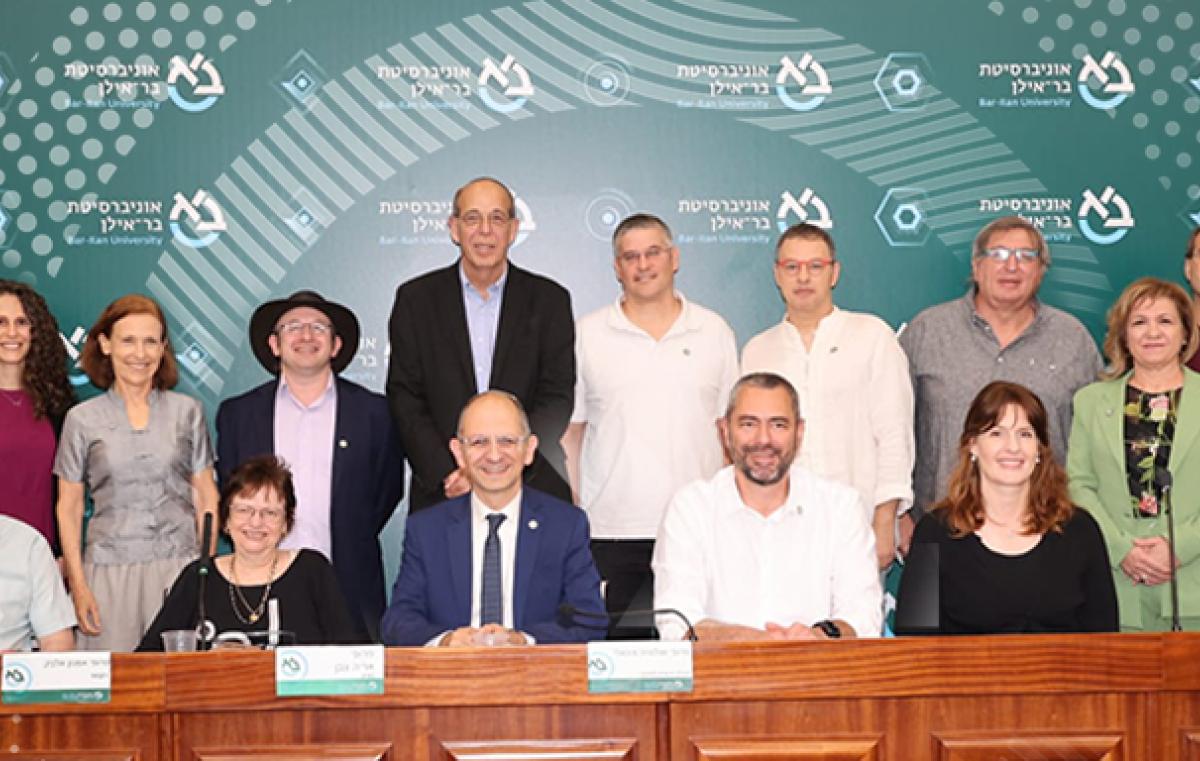2023 Rector's Award for Scientific Innovation
Eleven researchers recognized for their scientific achievements in previous academic year were chosen by two committees headed by BIU Rector, Prof. Amnon Albeck

The awarded researchers encompass a wide range of fields, all of which hold the potential to greatly impact and enhance our lives in the future:
Prof. Ronny Geva, Department of Psychology
The award is given to Prof. Ronny Geva for her contribution to improving the decision-making processes of leaders and commanders. In her study, she followed 1,300 combat commanders from their first day in the IDF and to their first position as combat commanders in the field, and examined the effectiveness of four different interventions to improve commanders' decision-making in real time.
Prof. Arie-Lev Gruzman, Department of Chemistry
The award is given to Prof. Gruzman for the development of a small organic molecule that showed significant therapeutic effects in animal models of autoimmune diseases by inhibiting the migration of white blood cells to the damaged tissues. The material also has no acute and chronic toxicity. In light of these results, the Japanese company Maruho invested $2,500,000 in the startup company Silverskate Bio, for the further promotion of the project.
Dr. Roy Horovitz, Department of Comparative Literature
The award is given to Dr. Roy Horovitz for his groundbreaking research in the field of biblical drama. Dr. Horovitz's book, "A World Without Guilt", includes an amazing research innovation: the discovery of three biblical plays by Jacob Shabtai, one of the greatest Hebrew writers, which were unknown to anyone and were discovered by Dr. Horovitz about 40 years after Shabtai’s death.
Dr. Gali Weissberger, Department of Social & Health Sciences
The award is given to Dr. Gali Weissberger for her research on financial exploitation of the elderly, an unfortunate yet common phenomenon that hadn’t been studied in Israel. Dr. Weissberger published a number of innovative articles in prestigious journals showing that poor financial decisions, risk of financial exploitation, and experiences of financial exploitation are early signs of Alzheimer's disease.
Prof. Cyrille Cohen, Goodman Faculty of Life Sciences
The award is given to Prof. Cyrille Cohen for developing a new treatment for multiple myeloma cancer and amyloidosis patients which is based on the production of white blood cells. The treatment is based on a new receptor developed in Prof. Cohen's laboratory which allows for a behavioral change in patients' immune system so that it works against the cancerous cells.
Prof. Elinor Saiegh-Haddad, Department of English Literature and Linguistics
The award is given to Prof. Elinor Saiegh-Haddad for developing and leading research on diglossia in the Arabic language, a situation in which children learn to read in a language dialect different from the dialect they speak. Prof. Saiegh-Haddad developed an original psycholinguistic approach that examines the effect of diglossia on the acquisition of literacy.
Prof. Asaf Pe’er, Department of Physics
The award is given to Prof. Asaf Pe’er for his contribution to understanding jet properties in the phenomenon called "gamma-ray bursts". Jet ejection of matter is very common, and is observed in many different astronomical systems and their observed speed seemed to vary from very slow to very fast without evident reasons. Pe’er’s research of the phenomenon proved that in about 60% of the observed gamma-ray sources, the speed of jets is significantly lower than previously assumed, making up for the observed gap in the speed distribution and changed the paradigm to as jets are naturally formed at all speeds.
Prof. Rachela Popovtzer, Kofkin Faculty of Engineering
The award is given to Prof. Rachela Popovtzer for her research in the development of "smart" nanoparticles for early diagnosis of diseases and targeted delivery of drugs. Prof. Popovtzer has developed an innovative technology that overcomes the "blood-brain barrier" and enables the efficient transport of biological drugs to the brain, for the treatment of cancer metastases and neurodegenerative diseases. The research that earned Prof. Popovtzer this year’s ERC grant from the European Union presents a groundbreaking approach to the transport of the CRISPR system to the brain, in order to enable the treatment of rare genetic brain diseases.
Prof. Yuval Feldman, Faculty of Law
The award is given to Prof. Yuval Feldman for an ambitious project trying to understand contexts in which democratic countries can build on trust-based regulation and voluntary public responsiveness, in situations where traditional means of regulation and enforcement are ineffective. Prof. Feldman won an ERC Advanced research grant for this project.
Prof. Eugene Plotkin, Department of Mathematics
The award is given to Prof. Eugene Plotkin for his achievements in the ring theory. Prof. Plotkin significantly contributed to the construction of the small cancellation theory for rings. The small cancellation theory for groups made a revolution in solution of the series of extremely difficult long-standing problems. Among them were the most challenging problems in group theory. Construction of the similar theory for rings was one of the principal objectives for many years. The influential project of Prof. Plotkin’s and his collaborators resulted in a great success and yielded the construction of a completely novel theory. This theory has already led to a progress in the solution of old problems such as a construction of the infinite dimensional over the center division algebra with a finitely generated multiplicative group.
Dr. Avi Shmidman, Berman Department of Literature of the Jewish People
The award is given to Dr. Avi Shmidman for developing a new model for analyzing Torah texts, based on Bidirectional Encoder Representations from Transformers technology. This is the first time that such a model has been created for Torah texts, and it is a breakthrough in developing a computerized system able to disambiguate the Torah. The model will pave the way for the widespread application of algorithms in the field of natural language processing and in the automatic analysis of Torah texts. The model was made available to the public to allow all those involved in the field to use it and discover new aspects in our literary heritage.